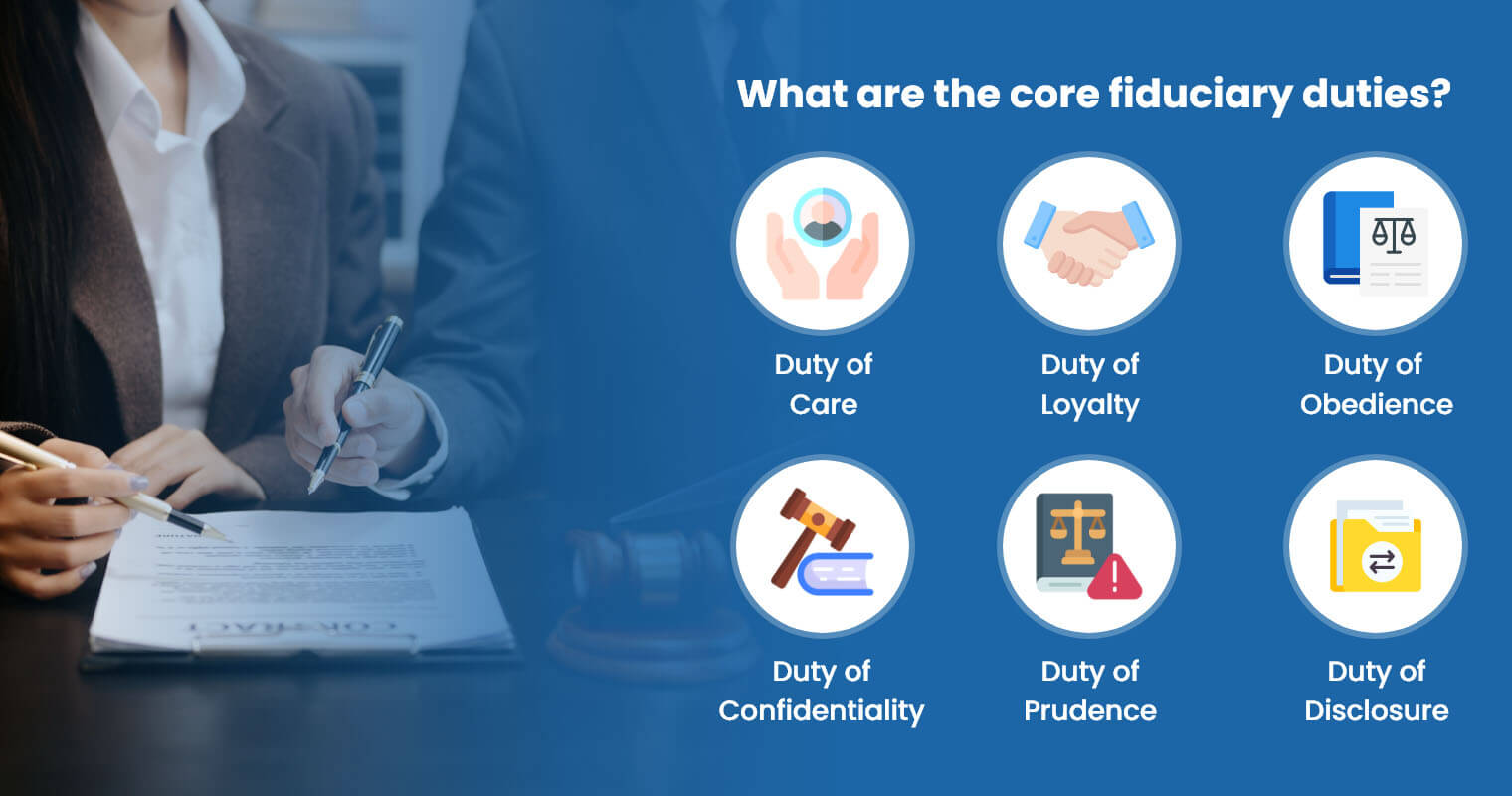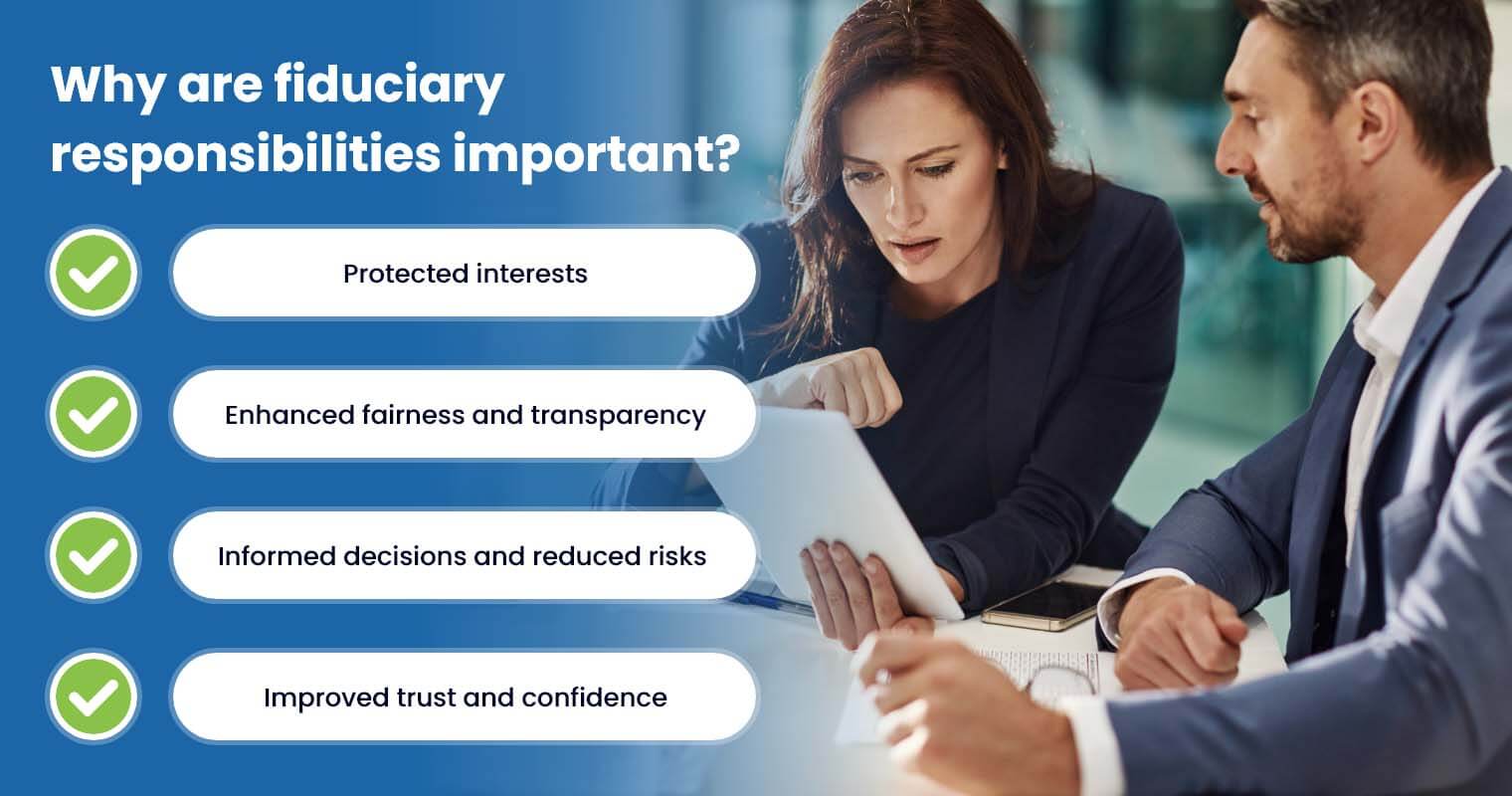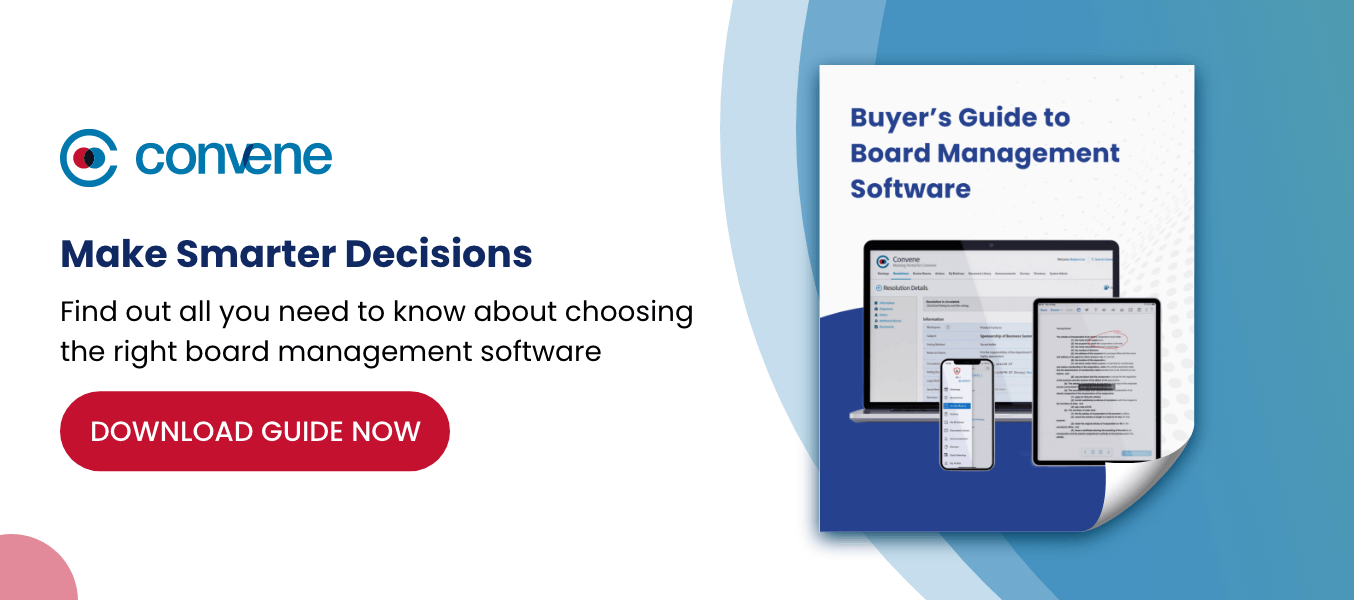Trust is the foundation of effective nonprofit governance. It builds connections, strengthens credibility, and fosters confidence. When trust is established, organizations thrive and achieve their shared goals more effectively.
One way to cultivate trust within nonprofits is through adopting fiduciary responsibility. It acts as a governance framework that demands leaders to prioritize the organization’s interests, fostering a sense of security among shareholders. Ready to learn more about fiduciary duties? This article dives into the basics of the fiduciary responsibility of nonprofit board members, offering insights into its different types plus examples.
What is a fiduciary?
An entity legally accountable for managing the funds or assets of another entity is referred to as a fiduciary. This connection between two parties forms a fiduciary relationship, where one is more dominant and acts on behalf of the other. Individuals and organizations rely on fiduciaries and their skills to arrive at reasonable and impartial business choices when it comes to handling assets or estates.
One example is executors who manage a deceased person’s estate. As the principal executor of the will, their primary responsibilities are investment management, tax compliance, and wealth distribution to beneficiaries. Other examples of fiduciary relationships are attorney-client, financial advisor-client, and trustee-beneficiary.
What is a fiduciary responsibility?
Fiduciaries are bound by fiduciary responsibilities to operate in the best interests of their beneficiaries. This implies prioritizing their welfare while preventing personal interests from influencing their decisions. They should act as stewards and conform to the legal and ethical boundaries imposed by the government, such as the Uniform Fiduciaries Act and the Uniform Trustees’ Powers Act. Fiduciaries’ dedication to their responsibilities is critical for preserving trust and confidence in the partnership while protecting the other party’s interests.
In nonprofit organizations, the board of directors performs fiduciary responsibilities. The fiduciary responsibility of board members is to protect and advance the organization’s mission by operating with care and honesty.
What are the core fiduciary duties?

Every fiduciary relationship is unique with distinct fiduciary responsibilities. Although varying, they are generally grounded in the same fundamental fiduciary duties. These fiduciary duty examples are:
1. Duty of Care
Duty of care refers to the obligation to act with the same level of care as one would for oneself. This encourages the demonstration of due diligence before making a decision. By taking caution and becoming highly aware of situations, fiduciaries will be more empowered to make informed decisions. This avoids committing bad calls that can cause serious damage to the beneficiary. To gain more information before making decisions, fiduciaries typically facilitate meetings with experts or conduct research and investigations.
2. Duty of Loyalty
Being loyal means doing ethical actions and avoiding awkward situations that may cause conflict, such as unfair dealings and unapproved transactions. This duty also urges transparency from fiduciaries by proactively informing beneficiaries about potential conflicts.
3. Duty of Obedience
Fiduciaries are obedient when they operate within the bounds of their authority. They must support beneficiaries in achieving their objectives with actions that comply with industry standards, organizational regulations, and government laws.
4. Duty of Confidentiality
Fiduciaries must respect the privacy and confidentiality of their beneficiaries. This instructs them to safeguard all data from unauthorized individuals and prohibits its use for personal gain.
5. Duty of Prudence
The duty of prudence involves upholding professionalism in decision-making to reach fair and reasonable judgments. It requires fiduciaries to exercise foresight and common sense in understanding the implications of every decision on the beneficiary and its long-term viability. Acting prudently helps mitigate risks and better protect the interests of beneficiaries.
6. Duty of Disclosure
Fiduciaries are responsible for disclosing information to beneficiaries that can affect their interests, such as legal violations, regulatory changes, and resignations. Failing to comply with this duty implies negligence, which can cause grave damages to the beneficiary.
Examples of Fiduciary Responsibilities in Nonprofit Boards
From the example scenarios below, acquire better insights into how fiduciary responsibilities apply in nonprofit boards.
- Duty of Care – A nonprofit board member notices a significant increase in the travel expenses of another board member. To review the matter thoroughly, the board asked for a cost breakdown with proper documentation. In this situation, the board exercised due diligence by requesting supporting documentation that could help them assess and justify whether the increase in spending was valid.
- Duty of Loyalty – One of the possible vendors for the program is a relative of the director. Knowing the situation, the director immediately informed the board to raise awareness of a potential conflict. The director then asked to be exempted from discussions, so as not to influence the board’s decision. The director in this scenario displayed transparency by informing the board about a possible unfair deal.
- Duty of Disclosure – A notice arrived at the office, informing the board of a possible legal violation. Instead of keeping this matter hidden and undisclosed, the board promptly sought legal counsel to discuss potential corrective actions. This shows the board’s honesty and prompt reaction to the issue.
- Duty of Prudence and Obedience – The board conducts regular audits to assess whether the finance team adheres to all relevant tax regulations and laws. Noticing mistakes in the financial records, the board implemented enhanced internal controls to minimize mismanagement. The board, in this example, tried to make the team comply better with relevant standards to improve outputs.
Why are fiduciary responsibilities important?

Fiduciary responsibilities oblige those in positions of trust to deliver high standards of care and loyalty to their beneficiaries. In nonprofits, these define legal and ethical boundaries within which board members must stay to prevent abuse of power in the organization. Fiduciary responsibilities are essential because of the following benefits:
1. Protected interests – Bylaws indicate that the board of directors should control and protect the assets of nonprofits. By imposing responsible decision-making, it guides the board to prioritize the organization’s welfare above anything else.
2. Enhanced fairness and transparency – Fiduciary responsibilities treat directors equally, compelling them to be transparent and declare their conflicts of interest. This establishes fairness and encourages better communication among leaders.
3. Informed decisions and reduced risks – Duty of care and prudence demand board members to make reasonable judgments. Employing a comprehensive decision-making process broadens directors’ perspectives, empowering them with deeper knowledge to make informed decisions.
4. Improved trust and confidence – Becoming a nonprofit director entails fulfilling several duties, such as overseeing operations, creating financial reports, and developing programs. By consistently demonstrating commitment to these responsibilities, beneficiaries will be more trusting of their directors.
What causes a breach of fiduciary duty?
A breach happens when a fiduciary fails to meet its responsibilities and compromises the beneficiary’s interests – the welfare they are obligated to protect. Common examples of fiduciary duty breaches include:
- Self-dealing
- Failure to distribute assets
- Undisclosed conflicts of interest
- Hidding pertinent information
- Negligence and incompetence
- Revealing trade secrets and other confidential information
These violations should not be taken lightly as they can lead to severe damages, causing financial losses, legal disputes, and reputational harm. So what can you do if your fiduciary commits a breach? A beneficiary may file a breach of fiduciary duty claim to hold the other party accountable for their actions.
Elements of a Breach of Fiduciary Duty Claim
Although the legal process for a breach of fiduciary duty claim varies from jurisdiction to jurisdiction, authorities typically require beneficiaries to provide the following elements:
- Fiduciary relationship: The reporting beneficiary must provide evidence proving a standing legal fiduciary relationship between themselves and the responsible party. This can be a contract indicating the fiduciary duties agreed upon by both sides.
- Breach: The beneficiary must disclose what type of breach the fiduciary committed.
- Damages: Lastly, to successfully file a claim, the beneficiary must provide documentation showing the damages the breach has caused them. This is important because breaches without evident damages are more difficult to prove when making a claim.
Best Practices to Prevent Breach of Fiduciary Claims

Preventing breaches is essential to limit disruptions and maintain stability within the organization. The process may appear complex and technical, but it can be manageable with proper planning, training, and oversight. Here are the nonprofit best practices you can adopt to prevent breaches in your nonprofit.
1. Legalize agreements between parties
Standardize the legalization of fiduciary relationships through contracts. These documents must clearly outline the expectations of the agreement and the limitations of the fiduciary’s authority. This way, it’s easier to backtrack when a breach occurs. Ensure you write a comprehensive contract that uses concise language to avoid disputes.
2. Introduce fiduciary duty
Organizations must establish processes for fiduciary duties early on. For example, bylaws should include provisions on proper conduct, conflicts of interest, and disputes. These direct the board of directors to fulfill their duties properly, reducing the risk of breaches.
3. Promote a culture of open communication
Openness and transparency between the board and stakeholders are crucial to success. This helps stakeholders feel more secure and trusting of the decisions of their board of directors. Additionally, cultivating these traits creates a more supportive and collaborative environment where boards are more confident in their actions.
4. Conduct performance and risk assessments
Beneficiaries have the right to conduct performance assessments of the board of directors to ensure they do their duties effectively. This includes reviewing financial transactions, investments, and other general decisions entrusted to the board. Conducting audits helps beneficiaries identify risks and their likelihood, which they can use to prevent future breaches or issues.
5. Employ a digital system for fiduciary risk management
Nonprofits can leverage board portal software to streamline fiduciary risk management. This advanced platform supports the complex risk management cycle by assisting boards in identifying, assessing, and controlling risks. Built to empower the boards, board portals centralize information and automate processes, enhancing efficiency and effectiveness during decision-making, assessments, and collaboration.
Strengthen Nonprofit Governance with Convene
Encourage more communities to trust your nonprofit by strengthening your governance practices! Modern governance practices are becoming increasingly popular. Fiduciary goes beyond just creating policies. It now involves providing stakeholders with smooth and reliable systems to make compliance easier and more streamlined.
Convene is a trusted board portal software with a solid track record supporting nonprofits from diverse categories in adopting modern governance. Our platform is designed to bring seamless experiences to nonprofit leaders in doing their duties and promoting their causes. We offer one of the best software in the market with a user-friendly interface, sophisticated security features, centralized document storage, paperless meetings, and automated workflows.
With Convene, nonprofits can expect the following benefits:
- Tailor-fit board portal interface
- Intuitive and granular meeting functionalities for responsible decision-making
- Dedicated client support with immersive onboarding training
- Unbreachable security infrastructure for data protection
Ready to experience smoother governance? See Convene in action with a FREE demo. Share your requirements with our Sales team and get started today!
Jean is a Content Marketing Specialist at Convene, with over four years of experience driving brand authority and influence growth through effective B2B content strategies. Eager to deliver impactful results, Jean is a data-driven marketer who combines creativity with analytics. In her downtime, Jean relaxes by watching documentaries and mystery thrillers.











